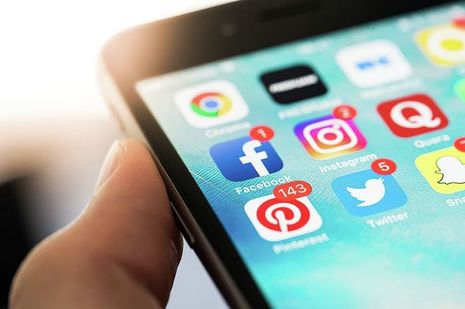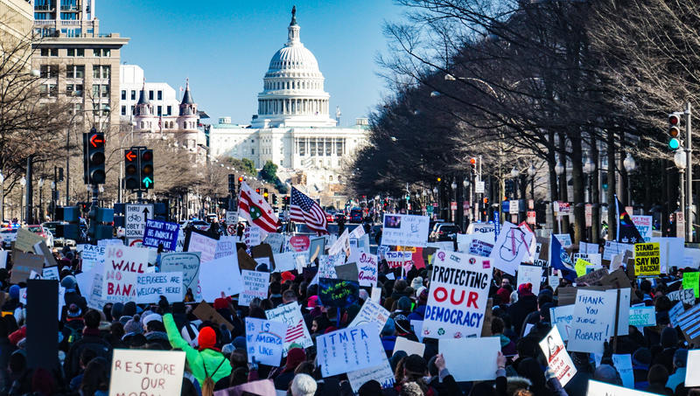Big Tech vs. free speech: The Republicans will be fine, but democracy might not be
In light of the attack on the Capitol and Trump’s removal from most major social media platforms, Toby Mayhew argues that the power these corporations have over our democracy must be checked.

In an unprecedented move, most major social media sites, including Twitter and Facebook, have removed Donald Trump from their platforms after he made a series of statements encouraging the storming of the Capitol. This divisive decision has prompted wider discussion about the politicisation of Big Tech, and the impact this has on our everyday lives – and our democracy. Whilst many have praised the ban, others, including Ted Cruz and Devin Nunes, have used their own large platforms to complain about the silencing of Republican voices. We are now once again embroiled in an age-old debate: where should we draw the line between free speech and hate speech?
Freedom of speech is one of our most fundamental democratic rights. But we must be clear that this freedom does not extend to inciting violence. Trump’s statement “If you don’t fight like hell, you’re not going to have a country anymore” clearly encouraged the violence that occurred on 6th January and added fuel to the fire of his pre-existing hateful comments and misinformation, which have caused many to wonder why his account wasn’t banned before.
“One person’s right to ‘freedom of speech’ should not supersede another’s right to life.”
In fact, by using his freedom of speech in this way, Trump has limited that of those who want to criticise him but fear the mob whipped up into a frenzy by his words. Many members of Congress outspoken against Trump, such as Alexandria Ocasio Cortez, have described fearing for their lives on the day of the attack; indeed, five people died. One person’s right to ‘freedom of speech’ should not supersede another’s right to life.
Of course, to state the obvious, social media sites are private companies and so, just as the Louvre isn’t suppressing our freedom of expression by not displaying our Year 5 artwork, Twitter has no requirement to keep us on its platform if we contravene its rules. Alex Jones’ account was permanently suspended in 2018, and Twitter has intervened regarding Donald Trump Jr’s account in the past, temporarily suspending him for spreading misinformation about coronavirus. Banning Trump is not a deliberate deviation intended to suffocate the Republicans, but a move consistent with the site’s previous actions and terms of service.
To my mind, there is no question that Trump deserves to have been banned – I am simply surprised it actually happened. The crackdown on anti-Semitic and white supremacist accounts that has accompanied this decision could and should have been implemented years ago: in Germany, in order to comply with anti-hate speech laws, Twitter already has policies dedicated to weeding out such accounts. The site previously had a policy of keeping elected officials on the platform due to ‘public interest’, yet only now, at the end of Trump’s time in office, has Big Tech shown itself willing to properly commit to recognising what ‘public interest’ really means.
Those who mourn the politicisation of Big Tech seem to ignore that it has been inherently political since its inception. Let us not forget that much of the organisation and misinformation behind the attack on the Capitol took place on these sites. Most social media companies have come under fire for the human prejudice hard-wired into their algorithms; YouTube has been shown to enable far right radicalisation in Brazil. Time and time again, we have seen how Big Tech is inextricably linked to politics precisely due to the massive impact it has on our lives, and in a business model where clicks generate revenue, doing nothing would simply highlight the fact that until now these companies have facilitated – and relied upon – this uptick in radicalisation. Is it surprising the former President was allowed free rein for so long?
“We should not give Big Tech a carte-blanche over deciding the parameters of public discourse.”
Trump’s ban was deserved. However, it is deeply concerning that a handful of companies with such a dubious record on these issues can choose whom they banish from what has become not only a soapbox, but an insight into the world around us. Rather than demonstrating the “first they came for the white supremacists” tale that is currently being spun, this is symptomatic of the greater issue of the power a small number of underregulated businesses can wield over our democracy. A step in the right direction would be to adopt a German-style approach to crime legislation, setting out clearly what constitutes an offence and its punishment, so that this power is removed from the hands of unaccountable corporations.
It is now painfully clear that Donald Trump’s access to large platforms on which he can spread misinformation and undermine faith in democratic processes has caused far more harm than good – yet we should not give Big Tech a carte-blanche over deciding the parameters of public discourse. Only once we accept that social media has always been heavily politicised will we be able to limit the negative impact it has on our democracy.
 News / SU reluctantly registers controversial women’s soc18 December 2025
News / SU reluctantly registers controversial women’s soc18 December 2025 Features / Should I stay or should I go? Cambridge students and alumni reflect on how their memories stay with them15 December 2025
Features / Should I stay or should I go? Cambridge students and alumni reflect on how their memories stay with them15 December 2025 News / Dons warn PM about Vet School closure16 December 2025
News / Dons warn PM about Vet School closure16 December 2025 News / Cambridge study finds students learn better with notes than AI13 December 2025
News / Cambridge study finds students learn better with notes than AI13 December 2025 News / Uni registers controversial new women’s society28 November 2025
News / Uni registers controversial new women’s society28 November 2025










